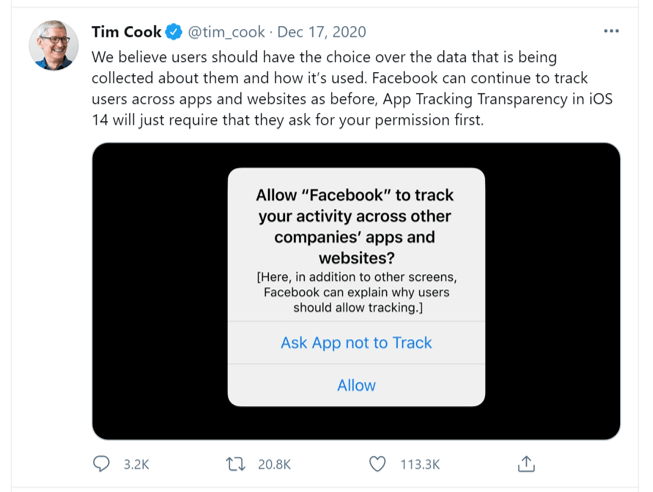Navigating the landscape of social media marketing can feel a little like the Wild West these days. Platform changes, privacy controls, shrinking organic reach, limited paid targeting – if you’ve found yourself asking if it’s all worth it, you’re not alone. So, is it really time for your brand to hang up its social media spurs and seek out greener pastures? Have we reached the end of the era? Let’s take a look at the facts, and what you should consider for your brand’s marketing plans when it comes to social media.
Social Media Users Show No Signs of Quitting.
Data shows that in 2020 there were over 3.6 billion people globally using social media with that number slated to rise to 4.41 billion by 2025. That’s right – rise. Social media use is still on the rise. What might surprise you even more is that (despite vociferous objections from Gen Z) Facebook still holds the top spot in terms of active users with 2.74 billion monthly active users in 2021. In fact, the top five platforms by active users in 2021 are:
#1: Facebook: 2.74 billion
#2: YouTube: 2.29 billion
#3: WhatsApp: 2 billion
#4: Facebook Messenger: 1.3 billion
#5: Instagram: 1.22 billion
Take into account the fact that Facebook owns four of those top five (Facebook, WhatsApp, Messenger and Instagram), and it’s clear that Facebook is still the king of the jungle when it comes to social media, at least for now.
Now, when we say active users, just how active are we talking? According to 2020 data, users ages 16 to 64 spend an average of two hours and twenty five minutes each day on social media. 2021 survey results show that 84% of US adults ages 18 to 29 are active on social media as are 81% of those ages 30 to 49. Usage does decrease in more mature users with 73% of those ages 50 to 64 in the US active on social media daily and only 45% of those 65 and above.
Why is all this important you ask?
Brands Have to Meet Customers Where They Are.
Whatever you may or may not know about all those social media users, there’s a good chance that a large portion of your customers are among them. Given the amount of time spent on social media these days, it is a critical strategic landscape for brands looking to meet their customers where they are. Not only that, but as social media has evolved, customers expect to be able to interact with brands in these spaces – whether that means inspiration for a purchase, asking questions about products or services or reaching out on a customer service issue. That’s unlikely to change in the near future. Research compiled in 2020 shows that 91% of users that follow a brand on social media will visit that brand’s website, 89% of them will buy from that brand and 85% will recommend the brand to a friend. And in terms of customer service, customers expect brands to be accessible and responsive with 74% saying that they reach out for customer service or support via social media. Beyond just interfacing with current customers, social media is also a primary space for brand research and discovery, particularly for millennial and Gen Z consumers.
All that means that given the sheer volume and concentration of social media usage among many target consumers, it is still important for brands to consider social media as a critical tool in their marketing strategy and communications plans. That’s why, despite all the challenges, big brands and retail marketers are reporting that they are doubling down on both their organic and paid investments on social with 2021 budgets holding strong or even rising.
Still, the Challenges of Marketing on Social Media Are Real.
As important as it is, social media marketing can also be challenging in a variety of different ways. It’s often difficult and time consuming to come up with and produce great organic content that stands out and performs well on social media, so in real terms, social media marketing isn’t free even if you aren’t paying for ads. Once you do come up with that brilliant piece of content, you’re confronted with the next reality: organic reach is continuing to shrink on social media platforms. For example, the average organic reach for a Facebook post is just 5.2% of the page’s total followers.

And then, there’s the ads. Apple’s big privacy update which rolled out in the spring with iOS 14.5 was a game changer allowing 96% of U.S. users (so far) to opt out of tracking, drastically reducing the amount of data and targeting options available to advertisers. Third-party tracking cookies are on the way out. Ongoing public discussion and concern about user privacy means that more changes are likely to follow. Many advertisers on social media have already seen a drop-off in their results, and successfully managing a paid social media campaign to deliver real business results takes more marketing prowess than ever before.
So, what’s a brand to do?
Know that Change Is the Constant.
As social media evolves, brands must evolve as well with strategies that are sharp and nimble to adapt quickly to the shifting landscape. Ongoing change is one thing you can count on. But that doesn’t have to be a bad thing for your brand. Smart adaptation is the key to success.
While social media as a whole is still a consumer stronghold, it’s important to remember that it is not static. You must grow, adapt and explore to succeed. Look for and consider new opportunities and new platforms. Facebook, Instagram and LinkedIn may still be social staples but the next big thing – read TikTok – is always right around the corner. (If you think TikTok is just for kids, read up on how its user base is changing here.) And there are always new tools being released to consider – like Reels, IGTV, hashtag and keyword capabilities just to name a few – that can improve reach and build engagement in new and different ways. Explore new content ideas and platform-favored mediums like video. Just make sure that whatever you choose is an authentic fit with both your audience and your brand.
It is also important to consider organic social media and paid social media in the context of an overall marketing strategy that utilizes a variety of tools and channels. You’re unlikely to find one placement or campaign that can carry the load of your brand’s success all on its own. (If you do, let us know.) However, social media is still a compelling and cost-effective channel as a part of a comprehensive integrated marketing approach, whether in a star or supporting role.
Remember that a strong focus on building value and relationship with your target customer base through exceptional, authentic brand experiences is always a smart way to drive an engaged audience that’s ready and waiting to hear what you have to say. From there, document your specific goals. Track and analyze your results. Refine and grow as you go.
So, Is Social Media Marketing Dying?
All signs point to no. But that doesn’t mean that it isn’t changing at its very foundations. It’s never been more critical to have a targeted, tailored strategy in place to ensure your brand’s social media success and to review and adapt quickly as the marketplace evolves.
Not sure where to start? Connect with the Clementine team to talk smart, savvy social.

